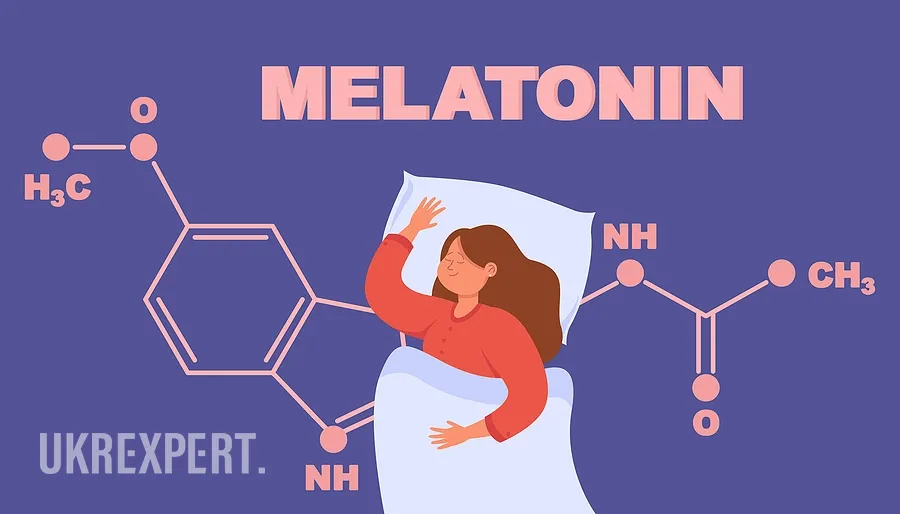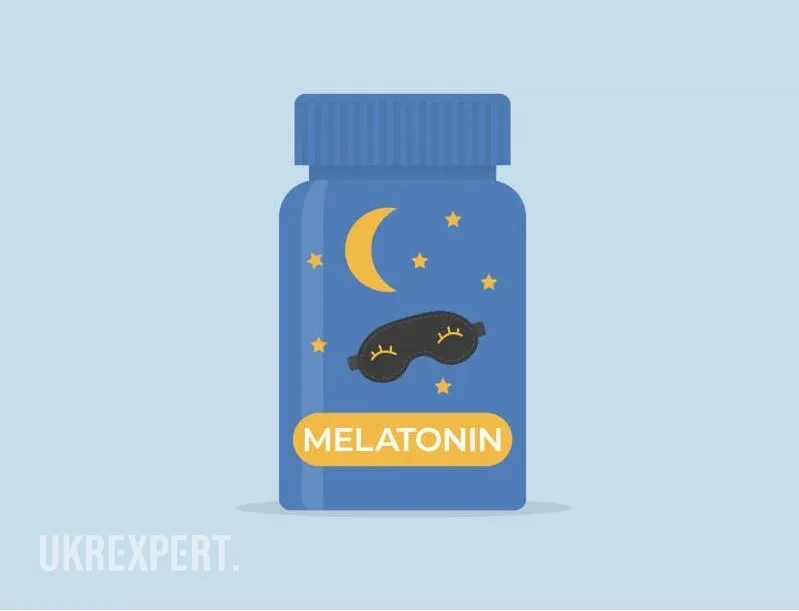
What is melatonin and how does it affect the body?

Melatonin, often referred to as the “sleep hormone,” is a substance that plays a key role in regulating the body’s circadian rhythm and maintaining healthy sleep. This neurohormone is produced by the pineal gland deep within the brain and responds to changes in light, controlling the human activity and rest cycle. Through melatonin, our body regulates biological processes such as sleep, emotional well-being, the immune system, and the functions of internal organs.
An important feature of melatonin is its production, which is synchronized with changes in environmental lighting. Under the influence of darkness, the pineal gland begins to produce more melatonin, helping the body prepare for sleep. This process plays a vital role in ensuring regular and high-quality sleep, which is an essential element of a healthy lifestyle.
Melatonin Physiology
Melatonin is produced in the deep parts of the brain, in a specific region known as the pineal gland. The process of melatonin production begins under the influence of darkness when neurons in this gland start converting the amino acid tryptophan into melatonin. This process is regulated by various internal and external factors, such as changes in lighting, health condition, and other biological cycles of the body.

Foods that Contain Melatonin
One way to ensure optimal levels of melatonin is by consuming foods that contain components necessary for its synthesis and regulation.
At the top of the list of foods that contain melatonin are seeds and nuts. Sunflower seeds, pumpkin seeds, and pine nuts are just a few examples that can be included in your diet to support healthy sleep. They are rich in tryptophan, an amino acid that promotes the production of melatonin in the body.
Fish, particularly salmon and tuna, are not only known for their heart and brain benefits but also serve as sources of melatonin. A noticeable concentration of melatonin is typically found in the meat and fat sections of these fish species.
Beans, black peas, and lentils are other excellent plant-based sources of melatonin. They not only provide the body with necessary proteins and carbohydrates but also contain components that stimulate melatonin production, promoting healthy sleep.
Cherries, as well as bananas and pineapples, which are rich in vitamin B6, are known for their high melatonin content. Even tomatoes, which are part of many culinary dishes, contain melatonin in small amounts.
Considering individual needs and characteristics, it is important to include these foods in your diet in accordance with your overall nutritional plan and lifestyle. Consuming melatonin-rich foods can be an important step towards improving sleep quality and overall health.

A diet balanced with melatonin-containing foods can help regulate the circadian rhythm and improve sleep quality.
Video about Melatonin
In this YouTube video, you can listen to a lecture on the importance of melatonin and its role in regulating sleep.
Read also our article: What is the kefir diet and how to lose weight in 7 days
Medical Use of Melatonin
The medical use of melatonin covers a wide range of applications, from treating insomnia to preventing various diseases. Here’s a detailed overview of its medical uses:
- Treatment of insomnia and sleep disorders. Melatonin is a natural sedative that can be helpful for those with sleep-related health issues. It helps calm the body and ensure peaceful, regular sleep.
- Support for maintaining the regular circadian rhythm. For people who work night shifts or travel across time zones, melatonin can help maintain the regular circadian rhythm and prevent jet lag syndrome.
- Support for mental health. Research shows that melatonin may have a beneficial effect on mental health, reducing symptoms of depression and anxiety.
- Treatment of certain neurological conditions. Some studies suggest that melatonin may be beneficial for patients with neurological conditions such as headaches, migraines, autism, and pulsatile tinnitus.
- Antioxidant properties. Melatonin is known for its antioxidant properties, which can help protect cells from damage caused by free radicals and reduce the risk of developing certain diseases.

Although melatonin is generally considered safe for short-term use, it is important to consult a doctor before starting any new melatonin regimen, especially if you are taking other medications or have medical conditions. A doctor can provide advice and recommendations on the best way to use melatonin for your specific health condition.
References
- Svyridova N.K., Belkina I.O., Ukrainian N.O. — “Features of melatonin use in modern conditions — successful experience and new opportunities” — 2021.
- Pishak V.P., Kryvchanska M.I., Ryznychuk M.O., Buly O.R. — “Melatonin: biological role and optimization of its use” — 2022.
- Timchuk K.Yu. — “Main physiological properties of melatonin” — 2022.
- Kryvchanska M.I. — “Effect of melatonin on sleep” — 2021
- Zamorskii I.I. — “Perspectives of the clinical use of melatonin” — 2022
Questions and Answers
Melatonin regulates the circadian rhythm by signaling the body that it is time to sleep.
Seeds, nuts, fish, fruits, and vegetables can be sources of melatonin.
Melatonin is used to treat insomnia, support the circadian rhythm, and improve mental health.
A low level of melatonin can lead to sleep disturbances, a decrease in emotional well-being, and overall health issues.
Factors that influence melatonin production include light levels, health conditions, and other biological cycles in the body.
The author of the Portal UKRexperts
Співпраця - текст
We are sure that knowledge should be accessible to everyone, and that is why UkrExperts strives to be your first choice when it comes to enriching intellectual potential.



